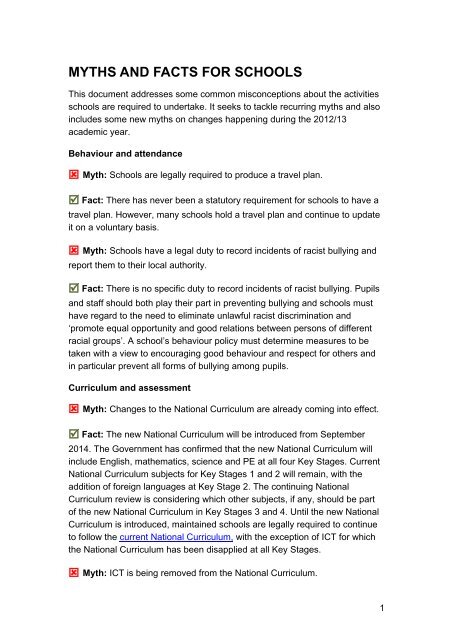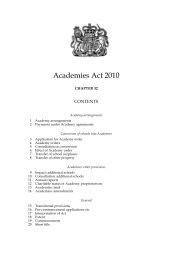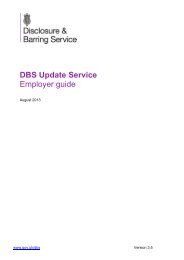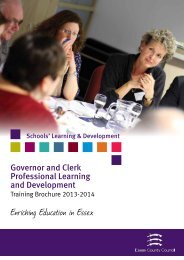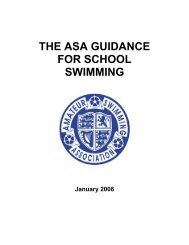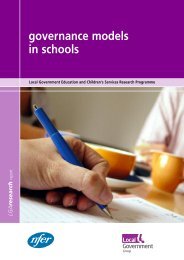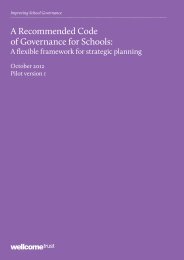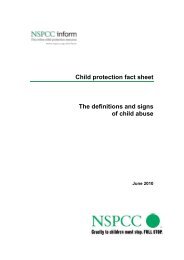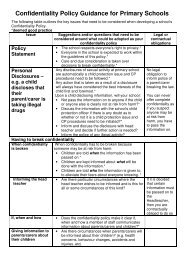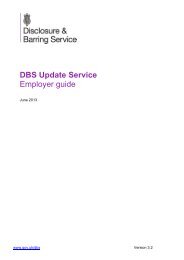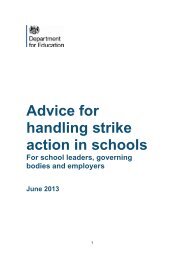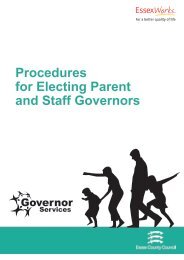Myths and facts for schools DfE updated 1 ... - the Essex Clerks
Myths and facts for schools DfE updated 1 ... - the Essex Clerks
Myths and facts for schools DfE updated 1 ... - the Essex Clerks
Create successful ePaper yourself
Turn your PDF publications into a flip-book with our unique Google optimized e-Paper software.
MYTHS AND FACTS FOR SCHOOLS<br />
This document addresses some common misconceptions about <strong>the</strong> activities<br />
<strong>schools</strong> are required to undertake. It seeks to tackle recurring myths <strong>and</strong> also<br />
includes some new myths on changes happening during <strong>the</strong> 2012/13<br />
academic year.<br />
Behaviour <strong>and</strong> attendance<br />
Myth: Schools are legally required to produce a travel plan.<br />
Fact: There has never been a statutory requirement <strong>for</strong> <strong>schools</strong> to have a<br />
travel plan. However, many <strong>schools</strong> hold a travel plan <strong>and</strong> continue to update<br />
it on a voluntary basis.<br />
Myth: Schools have a legal duty to record incidents of racist bullying <strong>and</strong><br />
report <strong>the</strong>m to <strong>the</strong>ir local authority.<br />
Fact: There is no specific duty to record incidents of racist bullying. Pupils<br />
<strong>and</strong> staff should both play <strong>the</strong>ir part in preventing bullying <strong>and</strong> <strong>schools</strong> must<br />
have regard to <strong>the</strong> need to eliminate unlawful racist discrimination <strong>and</strong><br />
‘promote equal opportunity <strong>and</strong> good relations between persons of different<br />
racial groups’. A school’s behaviour policy must determine measures to be<br />
taken with a view to encouraging good behaviour <strong>and</strong> respect <strong>for</strong> o<strong>the</strong>rs <strong>and</strong><br />
in particular prevent all <strong>for</strong>ms of bullying among pupils.<br />
Curriculum <strong>and</strong> assessment<br />
Myth: Changes to <strong>the</strong> National Curriculum are already coming into effect.<br />
Fact: The new National Curriculum will be introduced from September<br />
2014. The Government has confirmed that <strong>the</strong> new National Curriculum will<br />
include English, ma<strong>the</strong>matics, science <strong>and</strong> PE at all four Key Stages. Current<br />
National Curriculum subjects <strong>for</strong> Key Stages 1 <strong>and</strong> 2 will remain, with <strong>the</strong><br />
addition of <strong>for</strong>eign languages at Key Stage 2. The continuing National<br />
Curriculum review is considering which o<strong>the</strong>r subjects, if any, should be part<br />
of <strong>the</strong> new National Curriculum in Key Stages 3 <strong>and</strong> 4. Until <strong>the</strong> new National<br />
Curriculum is introduced, maintained <strong>schools</strong> are legally required to continue<br />
to follow <strong>the</strong> current National Curriculum, with <strong>the</strong> exception of ICT <strong>for</strong> which<br />
<strong>the</strong> National Curriculum has been disapplied at all Key Stages.<br />
Myth: ICT is being removed from <strong>the</strong> National Curriculum.<br />
1
Fact: ICT is still a National Curriculum subject <strong>and</strong> maintained <strong>schools</strong> will<br />
still be legally required to teach it. Ministers have confirmed that ICT will<br />
continue to be a National Curriculum subject at all four Key Stages when <strong>the</strong><br />
new National Curriculum comes into <strong>for</strong>ce in September 2014. However, <strong>the</strong><br />
legal requirement on <strong>schools</strong> to adhere to <strong>the</strong> specific National Curriculum<br />
Programmes of Study, Attainment Targets <strong>and</strong> statutory assessment<br />
arrangements has been removed. The existing Programmes of Study <strong>and</strong><br />
Attainment Targets are still available. The difference is that from September<br />
2012 <strong>schools</strong> can choose not to follow <strong>the</strong>m <strong>and</strong> instead teach an ICT<br />
curriculum that is more appropriate <strong>for</strong> <strong>the</strong>ir pupils.<br />
Myth: Work-related learning is compulsory at Key Stage 4.<br />
Fact: The statutory duty on <strong>schools</strong> to provide every pupil at Key Stage 4<br />
with work-related learning was removed from <strong>the</strong> National Curriculum with<br />
effect from 1 September 2012. More in<strong>for</strong>mation can be found on <strong>the</strong> <strong>DfE</strong><br />
website.<br />
Myth: There will be a Key Stage 2 writing test in 2013.<br />
Fact: There will not be an English writing test or English writing sample in<br />
2013. Instead, writing composition will be subject to teacher assessment<br />
(based on work from throughout <strong>the</strong> year), as recommended by <strong>the</strong> recent<br />
Bew review. The more ‘technical’ aspects of English (including grammar,<br />
punctuation <strong>and</strong> spelling) will be assessed by <strong>the</strong> new statutory test of English<br />
grammar, punctuation <strong>and</strong> spelling. This test will be externally marked.<br />
Myth: The Key Stage 2 writing teacher assessment return deadline is not<br />
changing this year.<br />
Fact: As a result of Lord Bew's review, <strong>the</strong> deadline <strong>for</strong> <strong>schools</strong> to submit<br />
teacher assessment <strong>and</strong> P scale data is being moved. Schools will be<br />
required to submit <strong>the</strong>ir teacher assessment be<strong>for</strong>e National Curriculum test<br />
results are returned to <strong>schools</strong>. This change is intended to place greater<br />
emphasis on teacher assessment judgements, which are independent of test<br />
results, <strong>and</strong> to give data earlier to secondary <strong>schools</strong> to assist planning. The<br />
deadline <strong>for</strong> submission of teacher assessment is Friday 28 June 2013.<br />
Myth: Science sample testing at Key Stage 2 is taking place this year.<br />
Fact: There will be no Key Stage 2 science sampling in 2013; a new,<br />
2
iennial, pupil-level sampling system will be introduced in 2014. However,<br />
<strong>schools</strong> are still required to submit science teacher assessments <strong>for</strong> each<br />
pupil. Schools will be provided with full details of science sampling in <strong>the</strong> 2014<br />
Key Stage 2 Assessment <strong>and</strong> Reporting Arrangements which will be<br />
published in <strong>the</strong> autumn.<br />
Exams <strong>and</strong> qualifications<br />
Myth: Schools can only offer qualifications at Key Stage 4 if <strong>the</strong>y have<br />
been approved <strong>for</strong> inclusion in <strong>the</strong> per<strong>for</strong>mance tables.<br />
Fact: Schools can offer any qualifications that have been approved <strong>for</strong><br />
pre-16 delivery. The qualifications approved <strong>for</strong> inclusion in <strong>the</strong> per<strong>for</strong>mance<br />
tables have demonstrated that <strong>the</strong>y are high quality, rigorous <strong>and</strong> provide <strong>the</strong><br />
greatest progression opportunities <strong>for</strong> <strong>the</strong> majority at Key Stage 4. Where it is<br />
in a pupil’s best interest, <strong>schools</strong> can teach qualifications not included on <strong>the</strong><br />
list.<br />
Myth: The Government has banned <strong>the</strong> practice of entering pupils early<br />
<strong>for</strong> GCSE examinations.<br />
Fact: There are no plans to ban this option, as <strong>the</strong> Government<br />
recognises that teachers are best placed to decide when to enter pupils <strong>for</strong><br />
examinations. However, teachers should be sure that early completion of<br />
GCSEs is right <strong>for</strong> individual pupils <strong>and</strong> may find <strong>the</strong> <strong>DfE</strong>’s research on this<br />
helpful. Please also see some Frequently Asked Questions on <strong>the</strong> changes to<br />
GCSEs from 2012.<br />
Health <strong>and</strong> safety<br />
Myth: Risk assessments are necessary <strong>for</strong> every school activity.<br />
Fact: Sensible management of risk does not mean that a separate written<br />
risk assessment is required <strong>for</strong> every activity. Schools do not need to carry out<br />
a risk assessment every time <strong>the</strong>y undertake an activity that <strong>for</strong>ms a regular<br />
part of <strong>the</strong> school day. Risks relating to <strong>the</strong>se routine activities should have<br />
already been considered when agreeing <strong>the</strong> school’s general health <strong>and</strong><br />
safety policy <strong>and</strong> procedures. A regular check to ensure that <strong>the</strong> precautions<br />
remain suitable is all that is required. Higher-risk activities, <strong>for</strong> example waterbased<br />
activities, should be properly planned <strong>and</strong> assessed. Fur<strong>the</strong>r<br />
3
in<strong>for</strong>mation can be found on <strong>the</strong> <strong>DfE</strong> website.<br />
Myth: All accidents involving pupils must be reported to <strong>the</strong> HSE.<br />
Fact: Accidents involving pupils only need to be reported to <strong>the</strong> Health <strong>and</strong><br />
Safety Executive (HSE) where <strong>the</strong> pupil's injury arises out of or in connection<br />
with a particular activity <strong>and</strong> where <strong>the</strong> pupil is taken from <strong>the</strong> scene of <strong>the</strong><br />
accident to hospital. Revised guidance specifically <strong>for</strong> <strong>schools</strong> can be found<br />
on <strong>the</strong> HSE website.<br />
Myth: All portable electrical equipment must be tested by a qualified<br />
electrician at least once a year (Portable Appliance Testing or PAT).<br />
Fact: The only requirement is that electrical equipment needs to be<br />
maintained, if not doing so would lead to danger. The HSE advise that <strong>for</strong><br />
most electrical equipment, visual checks <strong>for</strong> obvious signs of damage <strong>and</strong><br />
perhaps simple tests are sufficient. The HSE website contains fur<strong>the</strong>r<br />
in<strong>for</strong>mation.<br />
Myth: There is a minimum <strong>and</strong> maximum classroom temperature.<br />
Fact: There is no prescribed minimum temperature <strong>for</strong> workplaces<br />
(including <strong>schools</strong>) in health <strong>and</strong> safety legislation, but <strong>the</strong> temperature should<br />
normally be at least 16°C. There is equally no prescribed maximum classroom<br />
temperature. In<strong>for</strong>mation about ventilation <strong>and</strong> <strong>the</strong> avoidance of overheating<br />
<strong>for</strong> <strong>schools</strong> is available on <strong>the</strong> <strong>DfE</strong> website.<br />
Inspection, improvement <strong>and</strong> self-evaluation<br />
Myth: A written lesson plan must be produced <strong>for</strong> every lesson.<br />
Fact: There is no statutory obligation to produce a written lesson plan <strong>for</strong><br />
every lesson. Good planning is, of course, very important but both <strong>the</strong> <strong>DfE</strong><br />
<strong>and</strong> Ofsted are clear that lessons should not be planned in an<br />
overcomplicated or <strong>for</strong>mulaic way. Where <strong>the</strong> quality of teaching is weak, it is<br />
important that <strong>schools</strong> can provide evidence to show that proper planning to<br />
address this is in place.<br />
Myth: Ofsted inspectors expect to see lesson plans <strong>for</strong> all subjects, even<br />
where a school normally only asks <strong>for</strong> written plans <strong>for</strong> particular lessons.<br />
4
Fact: Inspectors will not expect teachers to do anything more than what<br />
<strong>the</strong>y normally do. It is important to stress that lessons should be planned <strong>and</strong><br />
well-structured although it is not necessary to have <strong>the</strong> planning written down<br />
<strong>for</strong> inspectors.<br />
Myth: If an underper<strong>for</strong>ming teacher is asked to produce written lesson<br />
plans, all teachers must produce written lesson plans.<br />
Fact: There is no reason why <strong>the</strong> same lesson planning requirements<br />
should be applied to high <strong>and</strong> under-per<strong>for</strong>ming teachers.<br />
Myth: A school cannot receive an overall effectiveness judgement of<br />
‘outst<strong>and</strong>ing’ if <strong>the</strong> quality of teaching by trainee teachers is not also judged to<br />
be ‘outst<strong>and</strong>ing’.<br />
Fact: This is not correct. Inspectors will take into account <strong>the</strong> full range of<br />
evidence, <strong>the</strong> context of <strong>the</strong> situation <strong>and</strong> <strong>the</strong> impact of teaching on pupils’<br />
learning over time be<strong>for</strong>e determining <strong>the</strong> quality of teaching. Inspectors will<br />
expect to see <strong>schools</strong> playing <strong>the</strong>ir part in developing <strong>the</strong> next generation of<br />
teachers. This is a particularly important aspect <strong>for</strong> good <strong>and</strong> outst<strong>and</strong>ing<br />
<strong>schools</strong>.<br />
Organisation, infrastructure <strong>and</strong> finance<br />
Myth: Academies do not have to comply with <strong>the</strong> School Admissions<br />
Code.<br />
Fact: Like all state funded <strong>schools</strong>, academies must comply with <strong>the</strong><br />
School Admissions Code. The Code applies to academies by virtue of <strong>the</strong>ir<br />
funding agreements.<br />
Myth: The Pupil Premium must only be spent on interventions prescribed<br />
by <strong>the</strong> Department.<br />
Fact: Schools are not instructed on how to spend <strong>the</strong> Pupil Premium.<br />
They are free to decide how to use <strong>the</strong>ir allocation, as <strong>the</strong>y are best placed to<br />
underst<strong>and</strong> <strong>the</strong> needs of <strong>the</strong>ir disadvantaged pupils. Schools are required to<br />
publish in<strong>for</strong>mation online about <strong>the</strong>ir use of <strong>the</strong> Pupil Premium <strong>and</strong> Ofsted<br />
inspectors will consider how well pupils who attract <strong>the</strong> premium are<br />
per<strong>for</strong>ming <strong>and</strong> how <strong>the</strong> Pupil Premium is being used to narrow attainment<br />
gaps between disadvantaged pupils <strong>and</strong> <strong>the</strong>ir peers.<br />
Myth: The governing body is responsible <strong>for</strong> drafting all school policies.<br />
5
Fact: The drafting of school policies can be delegated to any member of<br />
school staff as appropriate. A summary of <strong>the</strong> policies <strong>and</strong> o<strong>the</strong>r documents<br />
that governing bodies are legally required to hold can be found on <strong>the</strong> <strong>DfE</strong>’s<br />
website.<br />
Myth: The governing body is responsible <strong>for</strong> recruiting all school staff.<br />
Fact: The governing body is responsible <strong>for</strong> agreeing <strong>the</strong> number of staff<br />
employed at <strong>the</strong> school <strong>and</strong> must recruit <strong>the</strong> head teacher <strong>and</strong> <strong>the</strong>ir deputies.<br />
The recruitment <strong>and</strong> dismissal of staff below this can be delegated to <strong>the</strong> head<br />
teacher. It is <strong>for</strong> governing bodies to decide if <strong>and</strong> to what extent this should<br />
happen.<br />
Myth: Schools must produce an annual prospectus.<br />
Fact: The School In<strong>for</strong>mation Regulations 2012 removed <strong>the</strong> requirement<br />
<strong>for</strong> <strong>schools</strong> to produce an annual prospectus <strong>and</strong> introduced obligations <strong>for</strong><br />
maintained <strong>schools</strong> to publish certain in<strong>for</strong>mation on a website. New Funding<br />
Agreements will ensure that Academies <strong>and</strong> Free Schools publish <strong>the</strong> same<br />
in<strong>for</strong>mation as maintained <strong>schools</strong>, including <strong>the</strong>ir Pupil Premium allocation,<br />
spend <strong>and</strong> impact on attainment. The <strong>DfE</strong> website provides fur<strong>the</strong>r in<strong>for</strong>mation<br />
on <strong>the</strong> changes<br />
Safeguarding<br />
Myth: Schools must require enhanced CRB checks from all visiting<br />
workers.<br />
Fact: There is no legal requirement on <strong>schools</strong> to require enhanced CRB<br />
checks from all visiting workers. Schools should not check visiting workers<br />
who have already been checked by <strong>the</strong>ir employer or who are escorted whilst<br />
on-site. If visiting workers are going to teach or have unsupervised contact<br />
with pupils, <strong>the</strong> school should ask <strong>the</strong> employer to confirm it has checked<br />
those workers.<br />
Myth: Schools must require an enhanced CRB check on all volunteers<br />
who have contact with children, whe<strong>the</strong>r in a classroom or on a school trip.<br />
Fact: There is no legal requirement <strong>for</strong> <strong>schools</strong> to require enhanced CRB<br />
checks from all volunteers. Guidance on when <strong>schools</strong> should check, or<br />
consider checking, volunteers can be found on <strong>the</strong> <strong>DfE</strong> website. This<br />
6
guidance will be <strong>updated</strong> shortly to reflect wider changes to disclosure <strong>and</strong><br />
barring arrangements.<br />
Myth- The EYFS bans <strong>the</strong> use of mobile phones by parents in school<br />
playgrounds.<br />
Fact- The revised EYFS does not ban <strong>the</strong> use of mobile phones. Early<br />
years providers are required to have a policy on <strong>the</strong> use of mobile phones <strong>and</strong><br />
cameras by staff in <strong>the</strong> setting but this does not apply to parents. The intention<br />
is to ensure that mobile phones are only used when essential <strong>and</strong> staff are not<br />
distracted by <strong>the</strong>m from caring <strong>for</strong> children. If a school’s policy sets out<br />
principles in line with this <strong>and</strong> children are safeguarded <strong>the</strong>n this has met<br />
EYFS requirements. More in<strong>for</strong>mation on <strong>the</strong> EYFS can be found at Link<br />
Schools are able to impose a ban on parents using phones in<br />
school playgrounds but <strong>the</strong>re is no external law requiring, or <strong>DfE</strong> guidance<br />
recommending it.<br />
School trips<br />
Myth: Parental consent is needed <strong>for</strong> all school trips.<br />
Fact: Parental consent is not necessary <strong>for</strong> every off-site educational visit,<br />
only <strong>for</strong> those: involving nursery-age children; taking place out of school<br />
hours; or of a higher risk (<strong>for</strong> example a trip to use a climbing wall). Full<br />
guidance is available on <strong>the</strong> <strong>DfE</strong> website.<br />
Myth: There is a prescribed pupil to staff ratio <strong>for</strong> school trips.<br />
Fact: Pupil to staff ratios <strong>for</strong> school trips are not prescribed in law. Those<br />
planning trips are best placed to decide an appropriate number of adults<br />
taking into account <strong>the</strong> activity to be undertaken <strong>and</strong> <strong>the</strong> age <strong>and</strong> maturity of<br />
<strong>the</strong> pupils. For pupils aged 5 or under you should refer to <strong>the</strong> Early Years <strong>and</strong><br />
Foundation Stage framework.<br />
Myth: School staff must have a D1PCV license to drive a minibus.<br />
Fact: School staff can drive <strong>the</strong> school minibus without any special<br />
licence, as long as <strong>the</strong>ir employer agrees (<strong>the</strong> Local Authority, <strong>the</strong> governing<br />
body or proprietor as necessary) <strong>and</strong> as long as <strong>the</strong> following conditions are<br />
met:<br />
• The staff member obtained <strong>the</strong>ir car driving licence be<strong>for</strong>e 1 January<br />
7
SEN<br />
OR<br />
1997; <strong>the</strong> minibus contains a maximum of 17 seats (including <strong>the</strong><br />
driver’s seat); <strong>and</strong> <strong>the</strong> minibus is not being used <strong>for</strong> hire or reward;<br />
• The staff member obtained <strong>the</strong>ir car driving licence after 1 January<br />
1997 but: has held it <strong>for</strong> at least two years; is aged 21 or over; is not<br />
being paid to drive <strong>the</strong> minibus (save <strong>for</strong> out-of-pocket expenses); <strong>the</strong><br />
minibus weighs no more than 3.5 tonnes; <strong>the</strong> vehicle is used <strong>for</strong> social<br />
purposes; <strong>and</strong> is not being used <strong>for</strong> hire or reward.<br />
Myth: Individual Education Plans are required <strong>for</strong> children with Special<br />
Educational Needs (SEN) but without SEN statements.<br />
Fact: The use of Individual Education Plans (IEPs) <strong>for</strong> children with SEN<br />
but without statements is not a statutory requirement. The 2001 SEN Code of<br />
Practice recommends <strong>the</strong> use of IEPs. The Code is statutory guidance <strong>and</strong><br />
<strong>schools</strong> must take account of it when making provision <strong>for</strong> children with<br />
SEN. However, unless <strong>the</strong> Code is referring to legal duties, <strong>schools</strong> do not<br />
have to follow <strong>the</strong> guidance in <strong>the</strong> Code as long as <strong>the</strong> alternative<br />
arrangements <strong>the</strong>y make are as good if not better than what is recommended.<br />
Staffing <strong>and</strong> work<strong>for</strong>ce<br />
Myth: The post-Threshold, Advance Skills Teachers (AST) <strong>and</strong> Excellent<br />
Teachers (ET) st<strong>and</strong>ards have been abolished.<br />
Fact: They have not. The Independent Review of Teachers’<br />
St<strong>and</strong>ards recommended that <strong>the</strong> st<strong>and</strong>ards <strong>for</strong> Post-Threshold, Excellent <strong>and</strong><br />
Advanced Skills Teachers should be discontinued <strong>and</strong> that a new Master<br />
Teacher St<strong>and</strong>ard should be introduced. No decision has yet been taken <strong>and</strong><br />
<strong>the</strong> current post-threshold, AST <strong>and</strong> ET st<strong>and</strong>ards will continue as <strong>the</strong>y are <strong>for</strong><br />
<strong>the</strong> time being.<br />
Myth: The new Teachers’ St<strong>and</strong>ards apply only in maintained <strong>schools</strong>.<br />
Fact: Academies <strong>and</strong> independent <strong>schools</strong> do not have to assess <strong>the</strong>ir<br />
teachers’ per<strong>for</strong>mance against Part One of <strong>the</strong> Teachers’ St<strong>and</strong>ards (which<br />
deals with teaching) as part of an annual appraisal<br />
process). However, Ofsted inspectors will consider <strong>the</strong> extent to which <strong>the</strong><br />
Teachers' St<strong>and</strong>ards are being met when assessing <strong>the</strong> quality of teaching in<br />
<strong>schools</strong> including academies. Part Two of <strong>the</strong> Teachers’ St<strong>and</strong>ards (which<br />
8
deals with personal <strong>and</strong> professional conduct) apply to teachers in all <strong>schools</strong>.<br />
Academies <strong>and</strong> independent <strong>schools</strong> are required to assess NQTs against<br />
both Parts One <strong>and</strong> Two of <strong>the</strong> St<strong>and</strong>ards during <strong>and</strong> in <strong>the</strong> final assessment<br />
recommendation at <strong>the</strong> end of <strong>the</strong>ir induction period, if <strong>the</strong>y choose to offer<br />
statutory induction to <strong>the</strong>ir NQTs. The new Teachers’ St<strong>and</strong>ards can be found<br />
on <strong>the</strong> <strong>DfE</strong> website.<br />
Myth: All teachers should be assessed against <strong>the</strong> new Teachers’<br />
St<strong>and</strong>ards after 1 September as part of <strong>the</strong>ir appraisal.<br />
Fact: Although new Appraisal Regulations came into <strong>for</strong>ce on 1<br />
September 2012, most teachers’ end of year appraisals in <strong>the</strong> autumn term<br />
are likely to have taken place under <strong>the</strong> previous per<strong>for</strong>mance management<br />
regulations. This is because those regulations continue to apply in relation to<br />
any per<strong>for</strong>mance management cycle already in progress prior to 1 September<br />
2012. Similarly, <strong>for</strong> teachers who apply to be assessed against <strong>the</strong> post-<br />
Threshold st<strong>and</strong>ards between 1 September <strong>and</strong> 31 October 2012 (in Round<br />
12), using evidence from be<strong>for</strong>e 1 September 2012, <strong>the</strong> Core St<strong>and</strong>ards will<br />
still apply.<br />
Fur<strong>the</strong>r in<strong>for</strong>mation on <strong>the</strong> new Teachers’ St<strong>and</strong>ards, including additional<br />
myths <strong>and</strong> <strong>facts</strong>, can be found on <strong>the</strong> <strong>DfE</strong> website.<br />
Myth: Maintained <strong>schools</strong> can keep <strong>the</strong>ir previous per<strong>for</strong>mance<br />
management policies because <strong>the</strong> new appraisal regulations are optional.<br />
Fact: The new appraisal regulations are not optional. They apply to all<br />
maintained <strong>schools</strong>. Schools can retain many aspects of <strong>the</strong>ir previous<br />
arrangements if <strong>the</strong>y wish, but <strong>the</strong>re are three key requirements in <strong>the</strong> new<br />
regulations that were not features of <strong>the</strong> previous ones. These are:<br />
• Teachers must be told of <strong>the</strong> st<strong>and</strong>ards against which <strong>the</strong>ir<br />
per<strong>for</strong>mance will be assessed.<br />
• Teachers’ per<strong>for</strong>mance must be assessed against those st<strong>and</strong>ards.<br />
• Teachers must be given a written report of <strong>the</strong>ir appraisal which<br />
includes <strong>the</strong> assessment against st<strong>and</strong>ards.<br />
Myth: Fur<strong>the</strong>r Education (FE) teachers need to re-qualify in order to teach<br />
in <strong>schools</strong>.<br />
Fact: Since 1 April 2012, professionally-qualified FE teachers can teach in<br />
<strong>schools</strong> without fur<strong>the</strong>r training or assessment.<br />
Myth: Overseas trained teachers need to re-qualify in order to be able to<br />
9
teach in <strong>schools</strong>.<br />
Fact: Since 1 April 2012, suitably qualified teachers from New Zeal<strong>and</strong>,<br />
Canada, Australia, <strong>and</strong> <strong>the</strong> USA can teach in <strong>schools</strong> without fur<strong>the</strong>r training<br />
or assessment. Teachers from <strong>the</strong> EU are also allowed to teach without retraining.<br />
Myth: Initial Teacher Training cannot take place in a Pupil Referral Unit.<br />
Fact: Revised regulations came into <strong>for</strong>ce on 1 September 2012 to allow<br />
initial teacher training (ITT) to take place in Pupil Referral Units (PRUs). This<br />
includes allowing trainee teachers to carry out practical teaching experience<br />
<strong>for</strong> <strong>the</strong> purpose of an ITT course <strong>and</strong> <strong>for</strong> trainees on an employment-based<br />
teacher training scheme to be employed to teach in this setting.<br />
Work experience<br />
Myth: Work experience is difficult to arrange because of safeguarding,<br />
CRB checks <strong>and</strong> health <strong>and</strong> safety legislation.<br />
Fact: Employers do not have to carry out a CRB check on anyone on work<br />
experience. Also, <strong>the</strong> law has recently changed so that employers no longer<br />
need to carry out a CRB check on <strong>the</strong>ir staff who are supervising young<br />
people aged 16 or 17 on work experience. Young people on work experience<br />
are treated <strong>the</strong> same as employees of <strong>the</strong> same age under health <strong>and</strong> safety<br />
legislation. If <strong>the</strong> employer already employs 16 or 17 year olds, <strong>the</strong>y won’t<br />
need to take any fur<strong>the</strong>r action on health <strong>and</strong> safety issues.<br />
10


